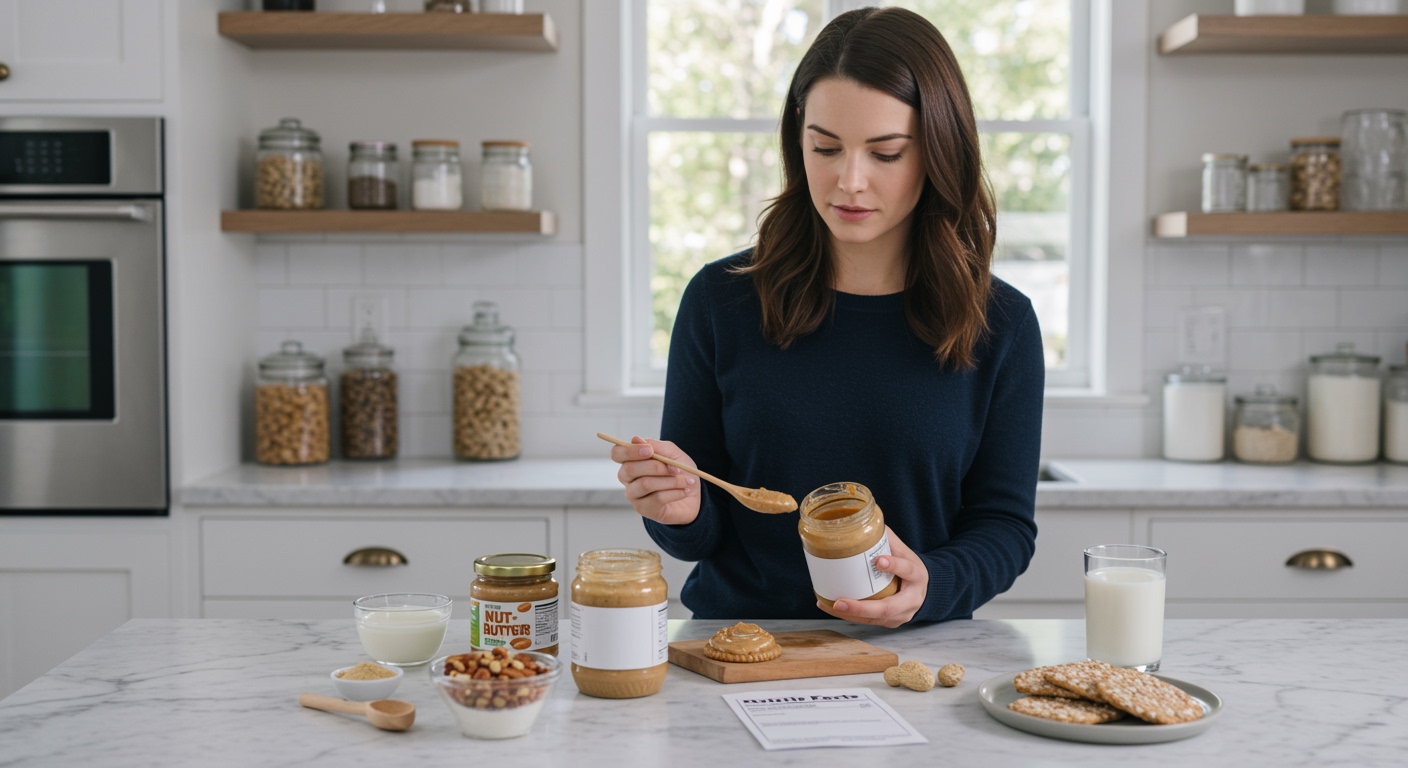✪ Key Takeaway: Natural nut butters can help PCOS by providing healthy fats and protein that stabilize blood sugar and reduce insulin resistance.
Introduction
You open your pantry and stare at that jar of peanut butter wondering if it will make your PCOS symptoms worse.
Many women with PCOS avoid nut butter completely because they fear it will spike their blood sugar or cause weight gain.
Hi, I am Abdur, your nutrition coach and today I am going to explain how nut butter can actually help manage PCOS when you choose the right types and eat them properly.
How Does Nut Butter Affect Blood Sugar In PCOS?
Nut butter contains a powerful combination of healthy fats, protein, and fiber that slows down sugar absorption.
When you eat nut butter, the fat and protein content triggers the release of hormones that signal fullness to your brain.
This satiety response helps prevent the blood sugar spikes that worsen insulin resistance in PCOS.
Research shows that women with PCOS who include healthy fats in their meals have better glucose tolerance throughout the day.
The magnesium in nuts also supports insulin sensitivity by helping cells respond better to insulin signals.
However, this only works when you choose natural nut butters without added sugars or hydrogenated oils.
✪ Pro Tip: Pair nut butter with fiber-rich foods like apple slices to further slow sugar absorption and maximize blood sugar stability.
Which Types Of Nut Butter Work Best For PCOS?
Almond butter tops the list because it contains the highest amount of vitamin E and magnesium per serving.
These nutrients directly support hormone production and help reduce the chronic inflammation common in PCOS.
Peanut butter can work too, but only if you choose natural versions with just peanuts and maybe salt.
Cashew butter provides copper and zinc, two minerals that support ovarian function and hormone balance.
Walnut butter offers omega-3 fatty acids that help reduce the inflammation that drives PCOS symptoms.
Avoid any nut butter with added sugars, corn syrup, or hydrogenated oils as these ingredients worsen insulin resistance.
The ingredient list should be short and simple with nuts as the first and main ingredient.
✪ Fact: Almond butter contains 37% more magnesium than peanut butter, making it superior for insulin sensitivity support.
How Much Nut Butter Should You Eat With PCOS?
Two tablespoons of nut butter provides the perfect balance of healthy fats and protein without excess calories.
This serving size gives you about 190 calories, 8 grams of protein, and 16 grams of beneficial fats.
Eating more than this amount can lead to weight gain, which worsens insulin resistance in PCOS.
The timing matters too – having nut butter with breakfast or as a snack helps maintain steady blood sugar levels.
Avoid eating nut butter late at night when your metabolism slows down and fat storage increases.
Measure your portions carefully because nut butter is calorie-dense and easy to overeat.
Use a measuring spoon instead of eyeballing portions to stay within the recommended serving size.
✪ Note: A single tablespoon of nut butter contains about 95 calories, so portion control is essential for weight management.
Can Nut Butter Help With PCOS Weight Management?
The protein and healthy fats in nut butter increase satiety hormones that help you feel full longer.
This fullness effect can prevent overeating and reduce cravings for sugary snacks that spike insulin.
Studies show that people who include nuts in their diet have better weight maintenance over time.
The monounsaturated fats in nut butter may also boost metabolism slightly and support fat burning.
However, nut butter only helps with weight management when eaten in controlled portions as part of a balanced diet.
The key is using nut butter to replace less healthy snacks rather than adding it on top of your current calorie intake.
✪ Pro Tip: Spread nut butter on celery sticks instead of crackers to reduce carbs and increase fiber for better PCOS management.
What Are The Best Ways To Include Nut Butter In A PCOS Diet?
Add nut butter to your morning smoothie with protein powder and berries for a hormone-balancing breakfast.
Spread it on apple slices or celery for a satisfying snack that combines fiber with healthy fats.
Use nut butter as a base for sugar-free energy balls mixed with oats and seeds.
Stir a tablespoon into plain Greek yogurt for extra protein and creamy texture.
Make a simple sauce by thinning nut butter with coconut milk for drizzling over roasted vegetables.
Avoid pairing nut butter with high-sugar foods like jelly or refined bread that spike blood sugar.
Focus on combinations that provide fiber, protein, and healthy fats to support stable insulin levels.
✪ Fact: Combining nut butter with fiber-rich foods can reduce the glycemic impact of a meal by up to 30%.
The Bottom Line
Natural nut butter can be a valuable addition to a PCOS-friendly diet when chosen and consumed wisely.
Small changes in food choices create big improvements in hormone balance over time.
I would love to hear about your experience with nut butter and PCOS management, so please share your thoughts or questions in the comments below.
References
At NutritionCrown, we use quality and credible sources to ensure our content is accurate and trustworthy. Below are the sources referenced in writing this article:





